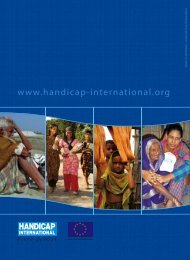Full page photo print - Harvard Law School Project on Disability
Full page photo print - Harvard Law School Project on Disability
Full page photo print - Harvard Law School Project on Disability
You also want an ePaper? Increase the reach of your titles
YUMPU automatically turns print PDFs into web optimized ePapers that Google loves.
community basis, thereby avoiding removal of children with disabilities from their<br />
families for placement in instituti<strong>on</strong>s. 6<br />
The 1993 Un standard Rules <strong>on</strong> the equalizati<strong>on</strong> of opportunities for Pers<strong>on</strong>s with<br />
disabilities (Standard Rules) addresses a number of issues directly relevant to the right of<br />
people with disabilities to live independently in the community, including:<br />
• Awareness-raising of the rights, needs, potential and c<strong>on</strong>tributi<strong>on</strong>s of people with<br />
disabilities in society (Rule 1);<br />
• Medical care and rehabilitati<strong>on</strong> services available in the local community (Rules 2 and 3);<br />
• Support services to promote independence and facilitate the exercise of rights by<br />
people with disabilities (Rule 4);<br />
• Physical, informati<strong>on</strong>al and communicati<strong>on</strong> accessibility (Rule 5).<br />
• Pers<strong>on</strong>nel training (Rule 19). 7<br />
The C<strong>on</strong>venti<strong>on</strong> <strong>on</strong> the Rights of Pers<strong>on</strong>s with Disabilities (CRPD) expands up<strong>on</strong> the issues<br />
addressed in earlier human rights documents and helps to clarify how States can respect,<br />
protect, and fulfill the right to live independently in the community. Because of the interrelated,<br />
interdependent, and indivisible nature of human rights, there are many articles in the<br />
CRPD relevant to the enjoyment of this right. However, Articles 19, 28, and 12 are especially<br />
important to issues of living independently and with dignity in the community.<br />
Article 19 of the CRPD explicitly addresses the right of people with disabilities to live<br />
independently and be included in the community. Specifically, Article 19 emphasizes the<br />
right of pers<strong>on</strong>s with disabilities to “have choices equal to others,” including the opportunity<br />
to choose where and with whom they live, and to not be forced to live in a particular living<br />
arrangement. Article 19 also requires States to ensure that people with disabilities have access<br />
to the kinds of supports and services they may need to enable them to live independently<br />
and avoid segregati<strong>on</strong> and isolati<strong>on</strong> from the community. Such supports might include<br />
pers<strong>on</strong>al assistance and/or other in-home or community services. Article 19 also requires that<br />
community services and facilities that are available to the wider populati<strong>on</strong> are also available<br />
<strong>on</strong> an equal basis to people with disabilities and that those services and facilities are also<br />
resp<strong>on</strong>sive to the needs of people with disabilities.<br />
Article 28 of the CRPD addresses the right to an adequate standard of living and social<br />
protecti<strong>on</strong>. Article 28 recognizes the right of people with disabilities to have an adequate<br />
standard of living, “including adequate food, clothing and housing, and to the c<strong>on</strong>tinuous<br />
improvement of living c<strong>on</strong>diti<strong>on</strong>s,” and to be able to enjoy this right without discriminati<strong>on</strong><br />
<strong>on</strong> the basis of disability. States must also ensure that people with disabilities enjoy social<br />
protecti<strong>on</strong> without discriminati<strong>on</strong> <strong>on</strong> the basis of disability. For example, people with disabilities<br />
(particularly women and girls with disabilities and older pers<strong>on</strong>s with disabilities) need to be<br />
assured equal access to clean water, social protecti<strong>on</strong> and poverty reducti<strong>on</strong> programs, public<br />
housing, and retirement benefits and programs.<br />
States’ obligati<strong>on</strong>s with regard to the right to live independently and with dignity in the<br />
community include:<br />
1. Obligati<strong>on</strong> to respect the right by ensuring that State actors such as government officials<br />
do not interfere with the exercise and enjoyment of the right by people with disabilities;<br />
2. Obligati<strong>on</strong> to protect the right by ensuring that n<strong>on</strong>-State actors such as businesses and<br />
6 See http://www.unhcr.ch/html/menu2/6/crc/doc/days/violence.pdf<br />
7 See http://www.un.org/esa/socdev/enable/dissre00.htm<br />
154 hUmAn RighTs. yes! AcTi<strong>on</strong> And AdvocAcy <strong>on</strong> The RighTs of PeRs<strong>on</strong>s wiTh disAbiliTies




